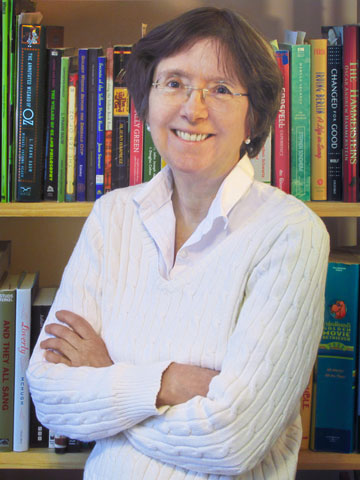
Carol de Giere
Many people talk about theater as a transformative experience, but few experience that transformation quite as drastically as Carol de Giere did when she discovered "Godspell."
Growing up in Madison, Wis., she mostly saw movie musicals or plays at school. Somehow one of the most widely produced musicals of all time never crossed her path until she was in her late 40s and living in Fairfield, Iowa, a town with a population of around 10,000. Artistic offerings were limited there, so when the local community theater presented "Godspell," de Giere attended the show. And that was the beginning of the end of her days in Fairfield.
"I felt myself being emotionally expanded," de Giere, 63, said during a phone interview from her home in Bethel, Conn. "The score and the performances were so joyful. It was just exhilarating to watch. I felt like it had a spirit to it that was different from other musicals. It lifted me out of the boundaries of the moment."
It also lifted her out of the Midwest. She quit her job as a librarian and moved, with her husband who had been laid off, to Connecticut to explore the musical theater work of the composer of "Godspell."
"I felt I needed to be near Broadway. I wanted to be close to the creative pot to see what the chefs were brewing."
Her exploration led to her first book, Defying Gravity: The Creative Career of Stephen Schwartz, from Godspell to Wicked.
"I like writing behind the scenes," she said. "Rather than write about a musical, I like to recreate the experience of being present at the creation."
She found Schwartz and cast members willing to talk about their experiences with "Godspell," a show that began as a master's thesis for John-Michael Tebelak at Carnegie Mellon University, a thesis that was initially rejected by his adviser. It then had a stint off-off-Broadway, where its potential was spotted by producers who brought on Schwartz and gave him five weeks to compose new music.
"Godspell," as we now know it, opened off-Broadway on May 17, 1971, then moved to Broadway for a total New York run of six years. It has been translated into more than half a dozen languages, made into a movie and is still produced a couple hundred times every year in places around in the world. In public and parochial schools alone, "Godspell" is performed dozens of times each season.
Considering how many lives the show has touched, de Giere felt called to do a second book that focused solely on "Godspell" while the original cast members were still available to share their stories. The Godspell Experience: Inside a Transformative Musical, for which de Giere conducted nearly 40 interviews, features engaging anecdotes, exhaustive research and an analysis of the show's songs, several of which come from the Episcopal hymnal.
"I thought, 'I'm probably the only person who's going to do this.' This is a time when people will remember. They're all in their 60s or deceased. I'm writing for future generations."
Cast members tell lively stories about the creative process with Tebelak, who was the original director as well as the creator of this show drawn from the Gospels.
What made the mu-sical so different was that it didn't start with a script. Tebelak, who died in 1985, had the actors improvise Jesus' parables. What worked became part of the show. It was confusing for the actors at first, but Tebelak had tapped into what was to become bigtime entertainment: improvisation.
When "Godspell" was headed for off-Broadway, the producers hired Schwartz to set the Episcopal lyrics to livelier music. He drew from the artists he was listening to -- James Taylor, the Mamas and the Papas, the Supremes, Elton John -- to create a pastiche of his favorite pop styles. When additional lyrics were required, he turned to biblical passages.
"Stephen was one of the first people to integrate popular music into the style of musical theater," de Giere said. "It was innovative and it spoke to people musically."
The score, which features the breakout hit "Day by Day," is one of the reasons for the show's enduring popularity, de Giere says.
Another is the nondidactic way the parables are presented. In clowning around, the actors draw out the humor, but not in a satirical way. When done properly, the show leaves the audience with a strong appreciation for Jesus' message of compassion and fellowship.
In her epilogue, de Giere offers a reflection from former cast member Don Scardino: "I got letters from people who had quit drugs (including heroin), or gone back to their Bible, or patched up relationships with their mother or father after seeing 'Godspell.' They would say it's the power of the show and you playing Jesus, and I knew it had nothing to do with me. I would always write back and say it is the show. The show is divinely inspired."
[Retta Blaney is author of Working on the Inside: The Spiritual Life Through the Eyes of Actors.]



